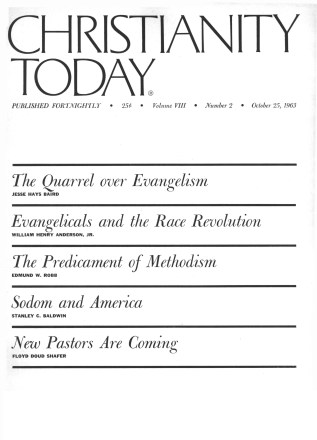When this review appears, I shall be in Rome at the second session of the Vatican Council, the Lord willing. With what expectations may one reasonably anticipate the coming council meetings? What will come from the commission, appointed by Pope John, with Cardinals Ottaviani and Bea as co-chairmen, that was charged with giving advice on the question of “the sources of revelation”? What will come of the tensions, so obviously present in 1962, between the progressive and conservative elements? What will be the influence of the new theology of men like Hans Küng, Karl Rahner, Yves Congar, Henri de Lubac, and others, most of whom will be present at the council in one function or another? Decisions will be made that will affect the course of the Roman Catholic Church for the rest of the century.
Past months have witnessed devotion of a great deal of ink to all of these questions. I would like here to make some observations on the Roman Catholic prognosis made by Joseph Ratzinger—a student of Karl Rahner—in a book devoted to the first session of the council.
We can summarize his judgment by saying that, according to Ratzinger, the really significant decision was made at the first session. He does not mean that many concrete decrees or decisions were made, other than one on liturgy. He means that the first session set the ship of Peter on course; it determined the direction for all that is yet to come. A very crucial turning point was reached one day in November, 1962, when a commission report on the sources of revelation was defeated by a vote of 1386 to 813. The chairman of the commission was the conservative Ottaviani. The mind of the council went against his report because it was scholastic in character, was irrelevant to pastoral work, failed to come to grips with modern problems, and had no meaning for the ecumenical dialogue. But the heart of the objection lay in the fact that the report was traditionalistically oriented to the notion of two separate sources of revelation, tradition and Scripture, and failed to make Scripture the unique source of revelation.
Ratzinger sets this decision within the larger context of the church’s posture as viewed by John XXIII when he declared that the church must appear on the world’s scene not merely as judge and critic, but as the dispenser of the medicine of mercy to the sick and troubled of the world. The vote in November, according to Ratzinger, was the council’s ratification of the words of John spoken at the opening. With this vote, a definite period of the church had ended, the period of negative criticism. The finished episode was, Ratzinger admits, necessary in its time: Pius IX and Pius X faced the crescendo of modernism, and this could only be confronted head-on and negatively. But now the church has assumed a more positive posture. The last symptom of the old era was the encyclical Humani Generis.
What Ratzinger says is confirmed by what I heard a highly placed Catholic say in Rome, that the “era of Humani Generis lies in tile irretrievable past.” The period following 1910 was, according to Ratzinger, one in which Rome was deathly afraid of modern tendencies and suffered anti-modernism neurosis. Now, however, the church can stand with a dynamic posture in the world: not negative, but positive; not against things, but for things. It can proceed with dialogue with the separated brothers, and reach out toward the needs of the world and the divisions of the Church. Thus, he concludes, while there are few tangible results stemming from the first session, a certain grace has become manifest, a conversion that is surprising and that provides solid reason for optimism. The real turning point has been crossed.
I had occasion to hear the thoughts of Ratzinger expressed on that emotion-packed day in November which he calls the decisive day, and I had a strong sense that he was right. The first session of the council cannot be undone, and there is no reason to suppose that the new pope intends to try to change the direction taken there. There may well, however, be resistance from the side of those who are restless about the new course Rome is taking and who discern in this a serious threat for the very foundations of the church. These men especially fear the newer biblical research carried on at, among other places, Rome’s Pontifical Biblical Institute.
With this we touch on problems that are haunting Protestantism as well as Rome. In Catholicism they are bound up with the infallible teaching authority of the pope, of course, but this does not mean that the same problems cannot exist in another context. We may think of the questions raised by Bultmann, of the problems centering on the methods of “form criticism,” of the literary and historical criticism of the Bible, of the question of evolution and creation, and others—questions which are also occupying the concern of Roman theologians and which, for them, are complicated by the fact that they are considered under the shadow of several “infallibly” uttered dogmas.
At any rate, the coming session of the Second Vatican Council is likely to be of immense significance for Rome. There are, to be sure, those who feel that nothing can really change in Rome in view of the pretensions of infallibility and the so-called infallible expressions of the past. These people usually feel, therefore, that the apparent shifts in Rome are hardly worth noting. I am of the opinion that this negative position is too simple. The new streams of influence and thought in Rome call for our extremely close attention—for the sake of our concern for Rome, but also because the problems facing Rome are problems which our churches are far from having solved, and are very much a part of the relation between the Christian faith and the modern world.










